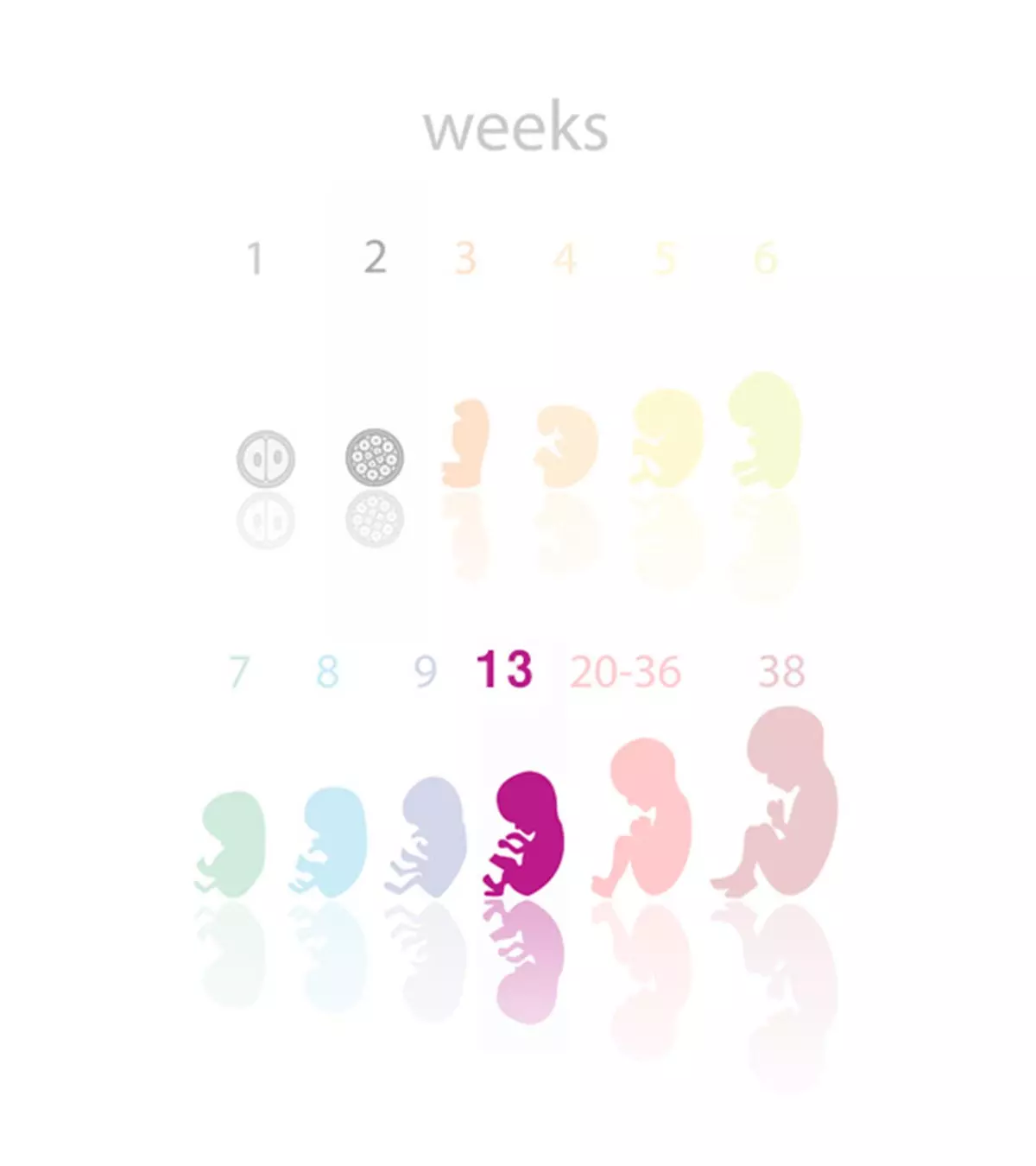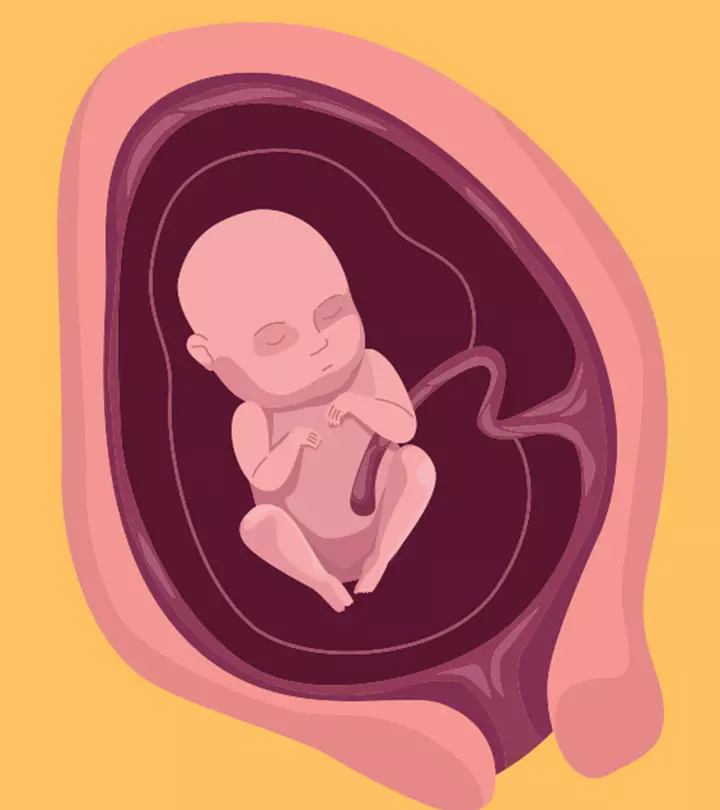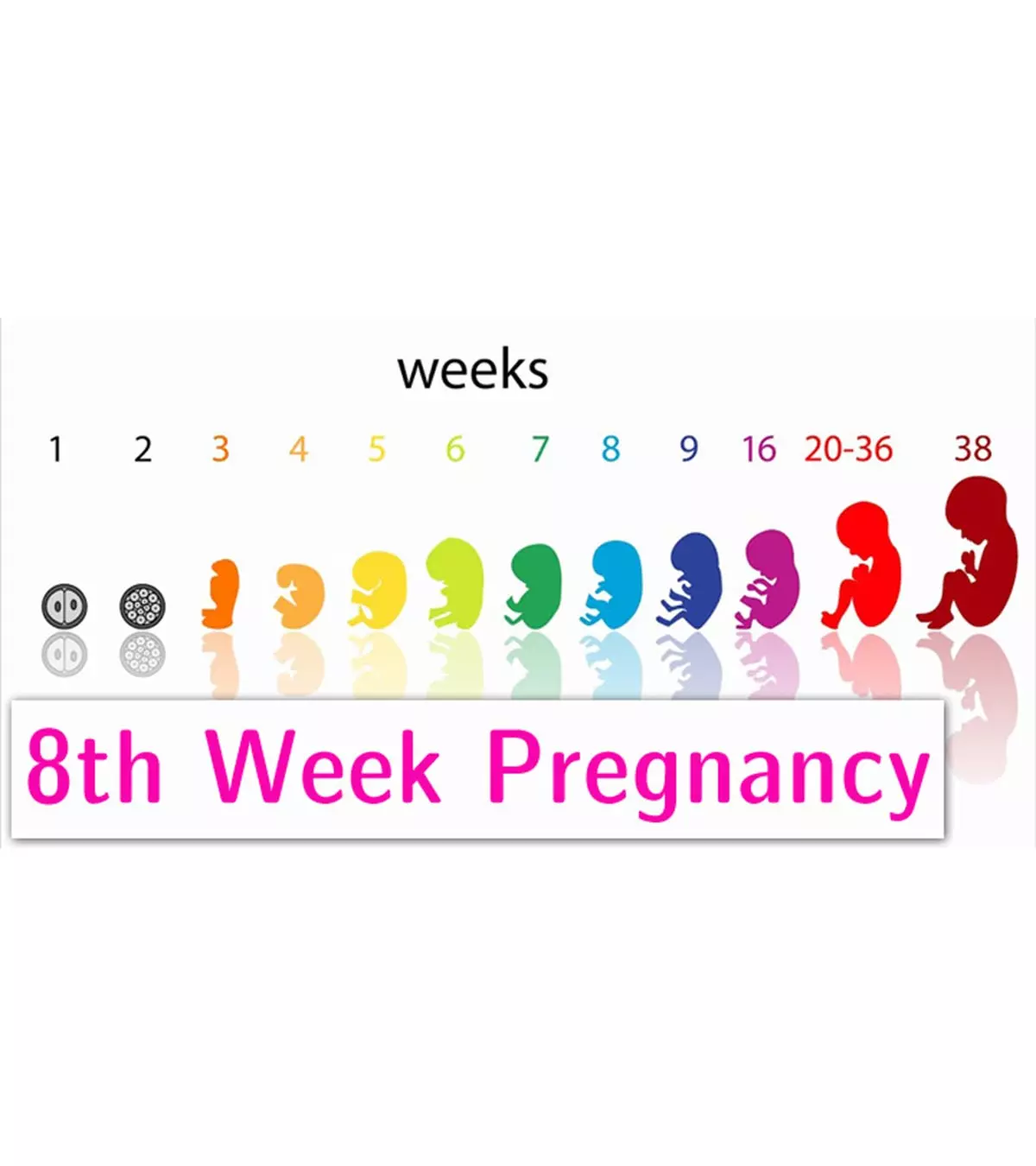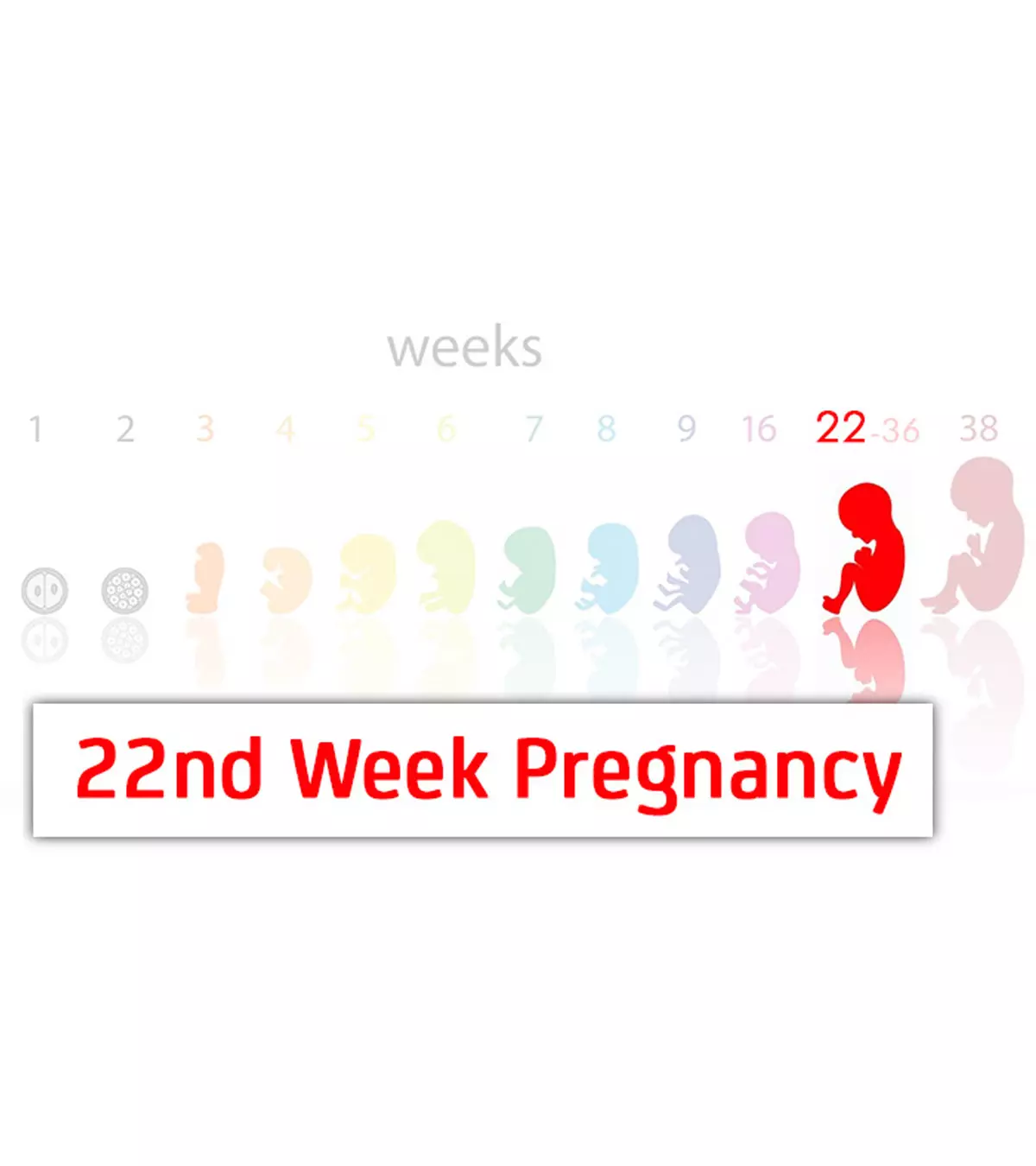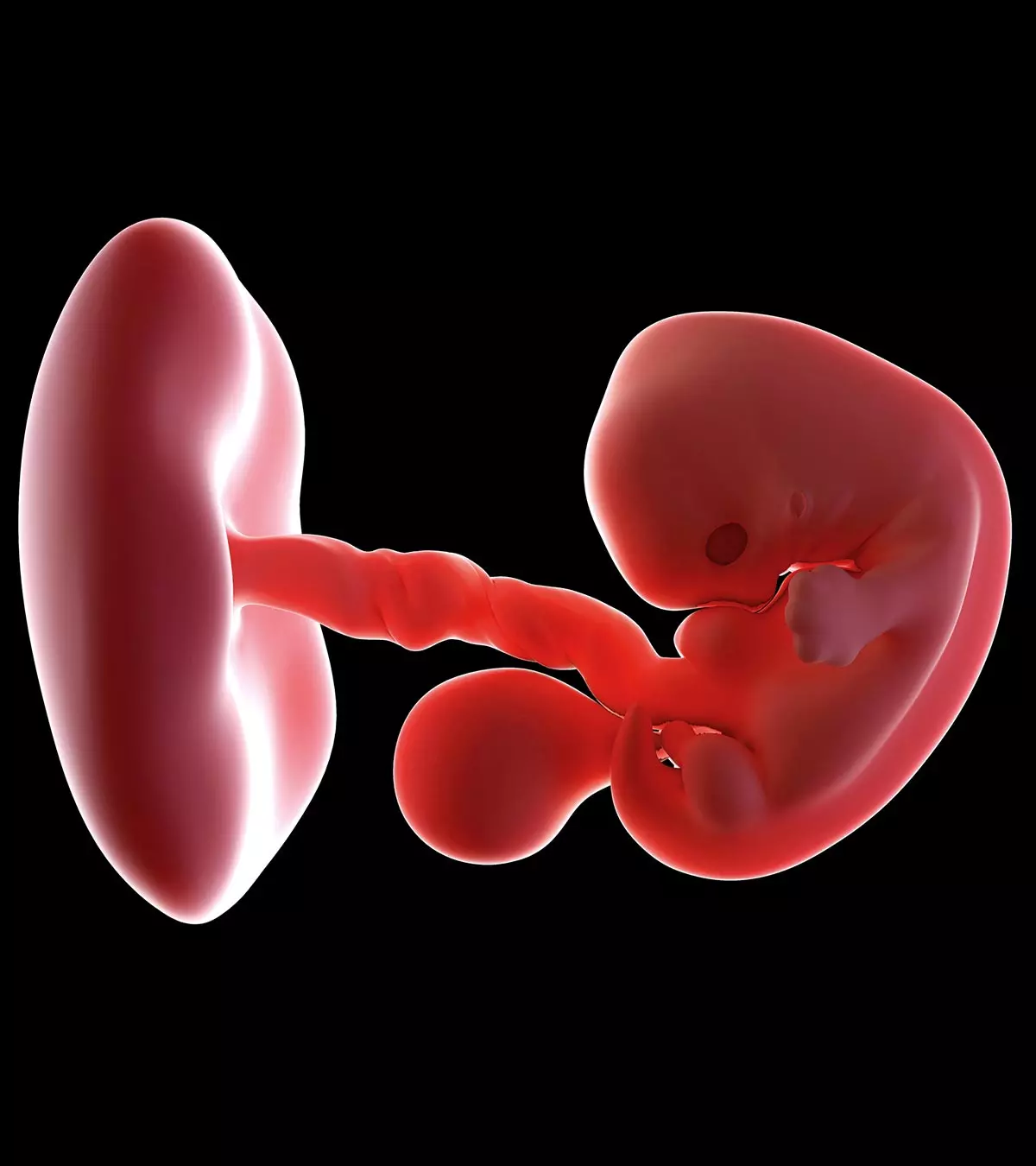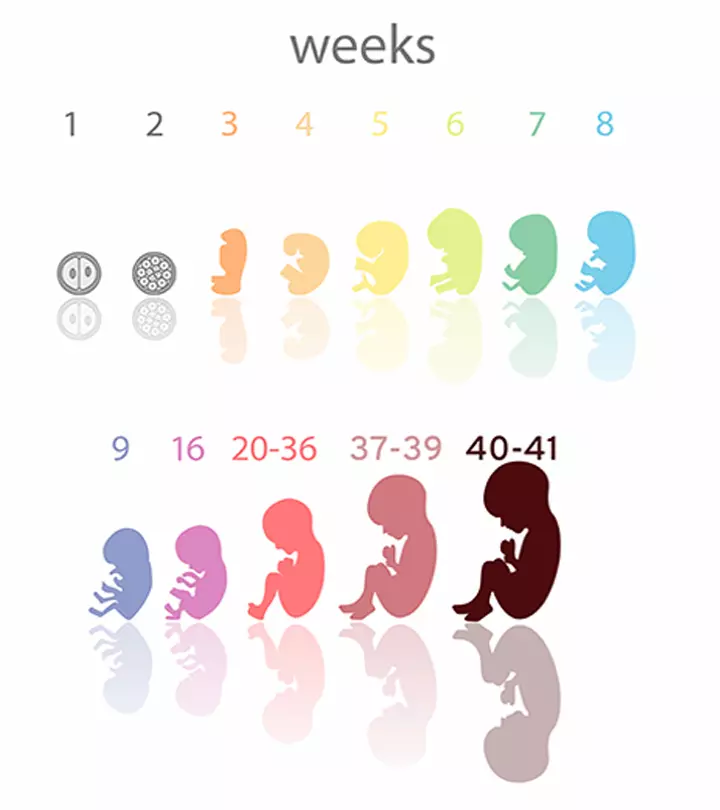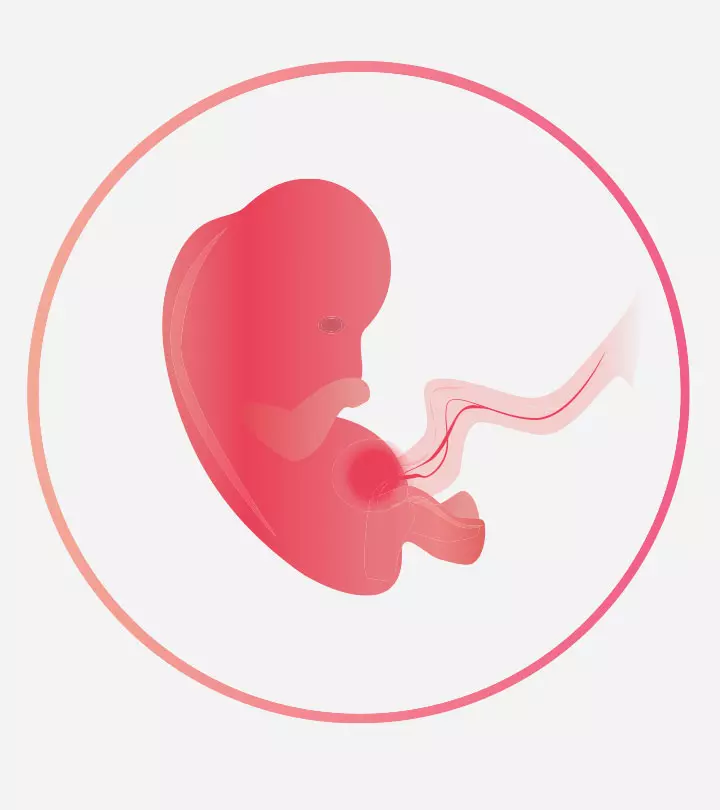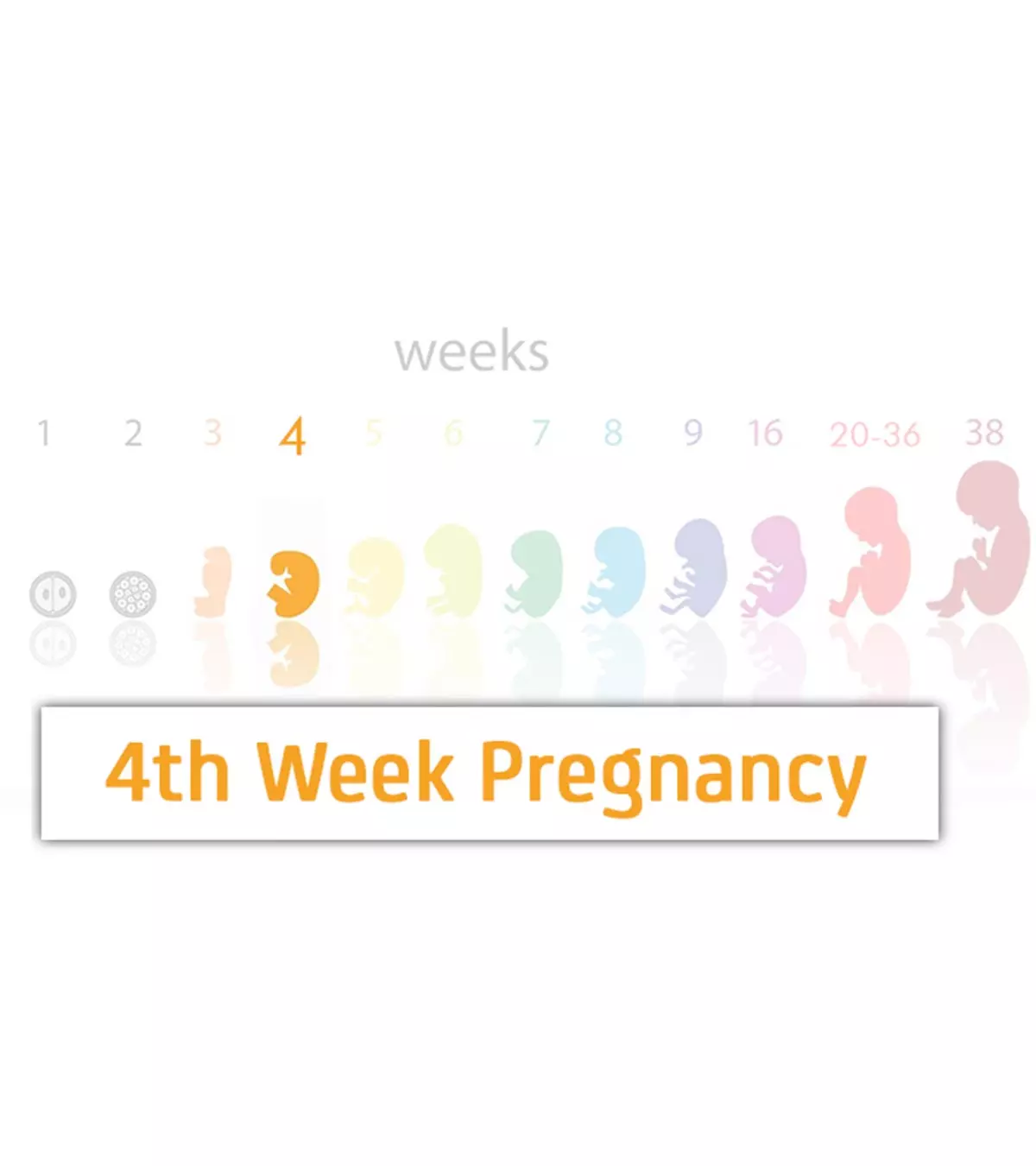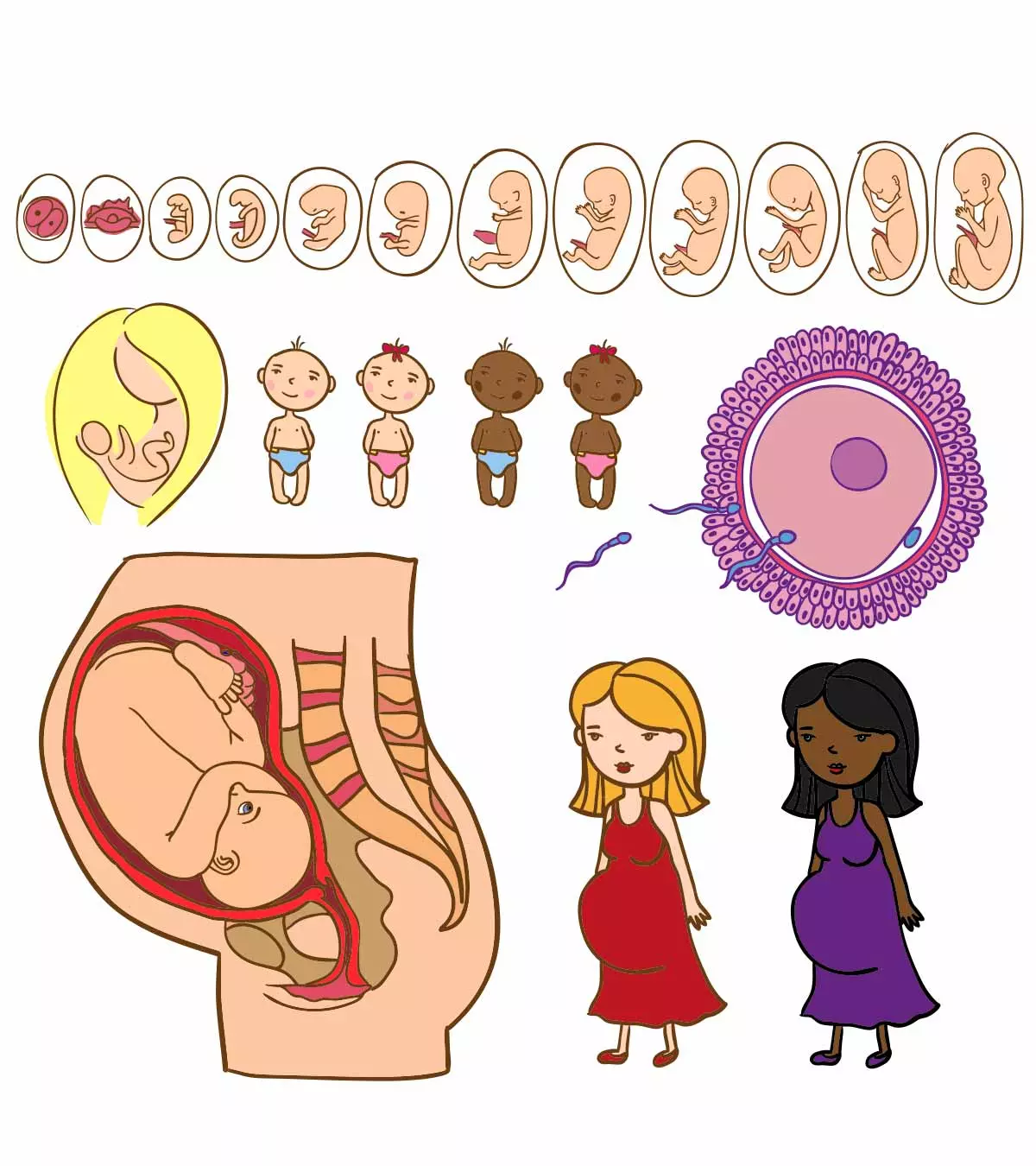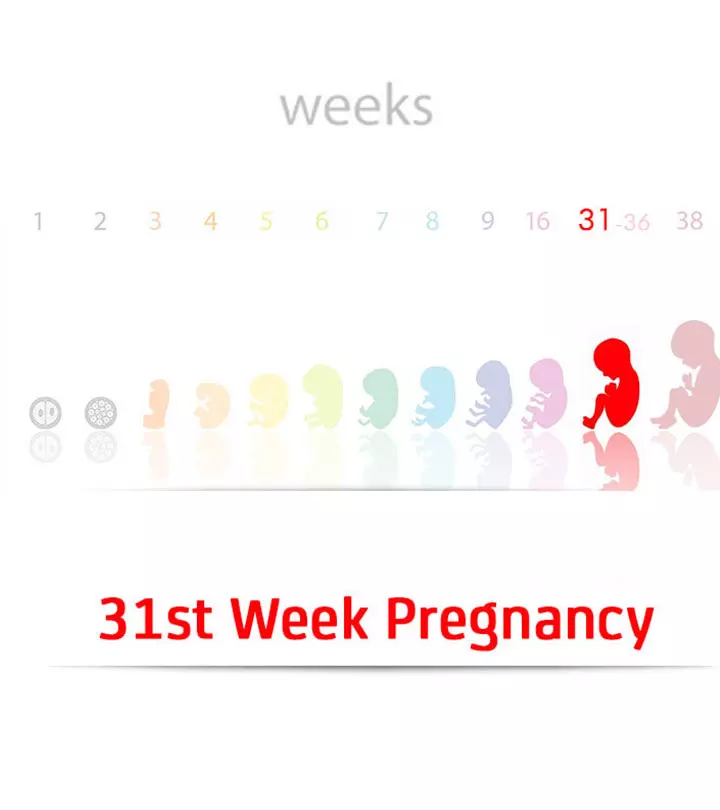
Image: Shutterstock

At 31 weeks pregnant, you are in the third trimester and about two months away from your due date. This stage often brings new symptoms such as backaches, heartburn, or increased fatigue as your body adjusts to your growing baby. As you prepare for the journey ahead, it is essential to pay attention to subtle changes and take steps to keep both you and your baby safe. This article provides insights into fetal development, common symptoms, and tips for a healthy pregnancy during the 31st week.
Key Pointers
- At 31 weeks, you’re near the end of the seventh month of pregnancy.
- The fetus is the size of a coconut, measuring 16.8 inches in length and weighing around 3.31lb.
- Fetus development includes fully-formed skin, bones, sense organs, kidneys, and responsiveness to light and loud sounds.
- Common physical discomforts for the mother at 31 weeks include shortness of breath, Braxton-Hicks contractions, frequent urination, backaches, headaches, and insomnia.
- Other possible discomforts are edema, balance, vein, nerve, and bowel problems, colostrum leakage, anxiety, and mood swings.
How Many Months Pregnant Are You At 31 Weeks?
You are in the third trimester of pregnancy at the 31st week of pregnancy and a week short of ending the seventh month. You will soon be in the eighth month.
Here, we elaborate on fetal development week by week, focusing specifically on the changes you may experience in the 31st week.
How Big Is Your Baby This Week?
At 31 weeks, your baby is about the size of a coconut.
Your baby measures 16.18in (41.1cm) in length and weighs about 3.31lb (1.5kg) (1).
Baby Development At 31 Weeks
Here is how the baby is developing in this week:

| Body parts | Developmental stage |
|---|---|
| Skin (2) | Looks smooth and less wrinkled. Fats get deposited under the skin layer |
| Lungs (3) | Still developing |
| Bones | Fully developed but are soft |
| Eyes | Are open, and the pupil can respond to light. Regular sleeping patterns are developed |
| Ears | Could get startled by loud noises |
| Brain | Developing faster and sending out a lot of signals |
| Heart (2) | More than 40 million heartbeats have occurred by this time |
| Kidneys (4) | Starts producing urine |
| Mouth | The baby starts to suckle and swallow and can get hiccups |
| Senses (5) | The baby can see, hear, taste, and feel the touch but cannot smell until delivery |
| Lanugo (6) | Begins to disappear |
 Quick fact
Quick factPregnancy Symptoms You Experience In The 31st Week
Here are a few symptoms you may experience this week:
- Weight gain: By the 31st week, the weight gain should be as follows (7):
| Body weight | Normal weight | Overweight | Obese |
|---|---|---|---|
| Weight gain | 27-39lb (12-18kg) | 22-35lb (10-16kg) | 18-30lb (8-13kg) |
- Shortness of breath as the diaphragm is pushed upward by the growing uterus. Breathing exercises can help you get relief.
- Braxton Hicks contractions are irregular, less painful contractions that help the body in preparation for labor. Drinking plenty of water and changing your positions can relieve the discomfort.
 Point to consider
Point to consider- Frequent urination due to the pressure exerted by the growing uterus on the bladder.
- Backaches because of the burden of carrying the extra weight of the baby.
- Headaches due to the hormonal fluctuations, stress, or dehydration. In some cases, a headache may be the first sign of pregnancy-induced hypertension.
- Diarrhea resulting from fluctuating hormones can slow down the digestion process. You could also become sensitive to certain foods, which can lead to diarrhea. In such a case, drink plenty of water and stay hydrated. Try to avoid spicy or preserved food. Go for fresh, home-made food and fruits.
- Clumsiness due to to the postural changes and a shift in the center of gravity of your body.
- Insomnia because of heartburn, frequent urination, and body aches in pregnancy. Take short naps during the day to get some rest.
- Forgetfulness due to stress and hormonal changes.
- Round ligament pain as the abdominal ligaments and muscles stretch.

- Edema of the feet and hands, which swell due to water retention in the body. It is mostly benign but in some cases it might indicate protein deficiency, anemia, altered thyroid function or pregnancy-induced hypertension.
- Varicose veins because the growing uterus applies pressure on the veins that carry blood from your legs to the pelvic area, restricting proper flow.
- Hemorrhoids develop near the rectal area due to pressure exerted by the uterus on the veins. They are painful and itchy.
- Sciatica – when the growing uterus puts pressure on the sciatic nerves, you experience excruciating pain in the back and at the back of the legs.
Kristin Moras, a 31-week pregnant woman and an avid blogger, shares some of her pregnancy symptoms, “I’ve hit my elbows and knees on more corners than I care to admit this week. I also managed to stub my toe on nothing (seriously) while walking down the hall. I guess I just didn’t pick my foot up high enough to clear the ground… I’m still forgetting conversations, to answer text messages, or what I’m wanting to say to people in mid-sentence. Pregnancy brain is no joke (i).”
While these are some of the health issues you might face in this week, there are also some other changes happening in your body and mind. Let’s see what they are.
Changes In The Body At 31 Weeks
Here are some physical and emotional changes that might occur in your body:
Physical changes
- Due to hormonal fluctuations, the nails become dry and brittle and could break easily.
- Yellow liquid, called colostrum, starts leaking from the nipples.
- The bump is bigger as the baby is growing in size. If you are carrying twins, then the belly looks more bulged. The linea nigra gets darker and prominent.

- The areolas get darker, and the nipples become erect and hard.
- The stretch marks are more prominent with the expanding belly.
- The blue veins are visible around the breasts and the thighs, due to the increased supply of blood to these areas.
Emotional changes
- Anxiety
- Mood swings
So, how is the baby doing this week?
Fetal Movements And Position During The 31st Week Of Pregnancy
The movement of the baby will be strong this week, but the frequency of movements might reduce to some extent.
Since the baby is growing, the space inside the uterus is not enough for the baby to move freely.
Your OB/GYN Visit
During your prenatal check-up this week, the doctor will:
- Advise a urine test to check the protein or sugar level
- Check your blood pressure
- Weight
- Swelling of hands, feet and other parts of the body
- Measure the size of the womb
- Monitor the fetal heart rate
 Did you know?
Did you know?
In case you have gestational diabetes, an ultrasound may be done to check the fetal position and the development of the baby.
You are likely to have the below tests:
- Fetal fibronectin (8): This test is performed to determine the possibility of a preterm. It is done if you have complaints of leaking or watery discharge or brownish mucoid discharge from vagina. The cervical fluid is analyzed for a glycoprotein called fibronectin, which is found between the amniotic sac and the uterine lining. A positive test result can be an indication of preterm labor or any other complications. However, a negative result can avoid unnecessary hospitalization.
- Fetal Doppler study: This is an ultrasound study focusing on blood flow to the baby and growth restrictions, if any.
If the test results are normal and your doctor gives you a clean bill of health, all you need to do is follow a healthy diet and regimen for a smooth delivery.
Tips For Mom-To-Be
- Drink plenty of water and stay hydrated.
- Stick to a healthy lifestyle and eat home-cooked food to ensure proper nutrition. Include fish like pollock, salmon, shrimp, catfish, anchovies, and cod which are excellent sources of omega-3 fatty acids. Avoid shark, tilefish, king mackerel, and swordfish as they contain high levels of mercury.
- Quit smoking, drinking alcohol, and excess caffeine intake.
- Continue taking prenatal vitamin supplements like folic acid and iron.
- Engage in moderate physical activities like walking. You can also consider mild exercises, such as Pilates to strengthen your pelvic floor and back muscles.
- Keep stress at bay.
- Get enough rest to prevent fatigue
- Do not take any medication without the doctor’s permission.
- Wear loose, breathable clothes.
- Maintain oral hygiene.
- Avoid exposure to toxic chemicals.
- Avoid cleaning cat litter to avoid toxoplasmosis.
- Avoid strenuous activity.
- Always sleep on your side.
- Practice meditation or mindfulness to manage stress.
- Attend childbirth classes and read books on parenting to prepare yourself for labor, delivery, and baby care.

- Carry fruits and snacks with you, if you are working and want to eat healthy when outside.
- Spend more time with family and friends.
- Start looking for baby names.
- Shop for cribs and other furniture for the baby’s room.
- Read books, watch movies and do anything that makes you happy.
 Quick tip
Quick tip As you near the due date, handling everything on your own becomes difficult. When you need help, reach out to your partner.
Tips For Dad-To-Be

Here’s what your partner can do:
- Help with household chores by sharing the responsibilities.
- Create a good environment at home.
- Attend all the prenatal visits with you.
- Plan for maternal shopping and outings.
- Give you a good neck and foot massage.
- Keep the medical documents and insurance papers handy.
Frequently Asked Questions
1. What position is the baby in at 31 weeks?
Most babies will lie vertically in the womb with their heads facing downwards at 31 weeks. It is the safest and most normal position for delivery (16).
2. How often should I feel the baby move at 31 weeks?
The expected count is about ten movements per hour. You may feel the baby kick, tap, or roll. If the count is less than ten, consult your Ob/Gyn to check on the baby (17).
3. Is it normal to experience increased fatigue during the 31st week of pregnancy?
It’s normal to feel tired and to lack energy at this stage (9). You might also feel dizzy during this time. However, remember that every pregnancy is unique. Some women may feel more tired than others. Also, some women feel tired throughout their pregnancy, while others don’t feel fatigued (10). Increased body weight, hormonal changes, disturbed sleep, and decreased lung capacity are some reasons that contribute to fatigue during the week of gestation.
At the 31st week of pregnancy, your baby will be developing fast. Skin will start looking smooth, their lungs are developing, and bones will be soft but fully developed. Their movements will be stronger but lesser in frequency as the space inside the uterus decreases. You may experience shortness of breath, frequent urination, backaches, and insomnia. Your nails may become dry due to hormonal changes, and blue veins may be visible on your breasts and thighs. During the 31st week of pregnancy, expectant mothers may experience a range of emotions, from excitement and anticipation to anxiety and fear of the unknown. This is the time for you to stay relaxed, take adequate rest, and spend more time with friends and family.
Infographic: Pregnancy Symptoms During The 31st Week
During the 31st week of your pregnancy, your body will change drastically as your baby develops in the womb and prepares for childbirth. Therefore, you can see various pregnancy-related symptoms occurring in the body, as mentioned in the infographic below. Knowing these symptoms will help you prepare for the upcoming experiences of this magical journey.
Some thing wrong with infographic shortcode. please verify shortcode syntaxIllustration: 31 Weeks Pregnant: Symptoms And Baby Development
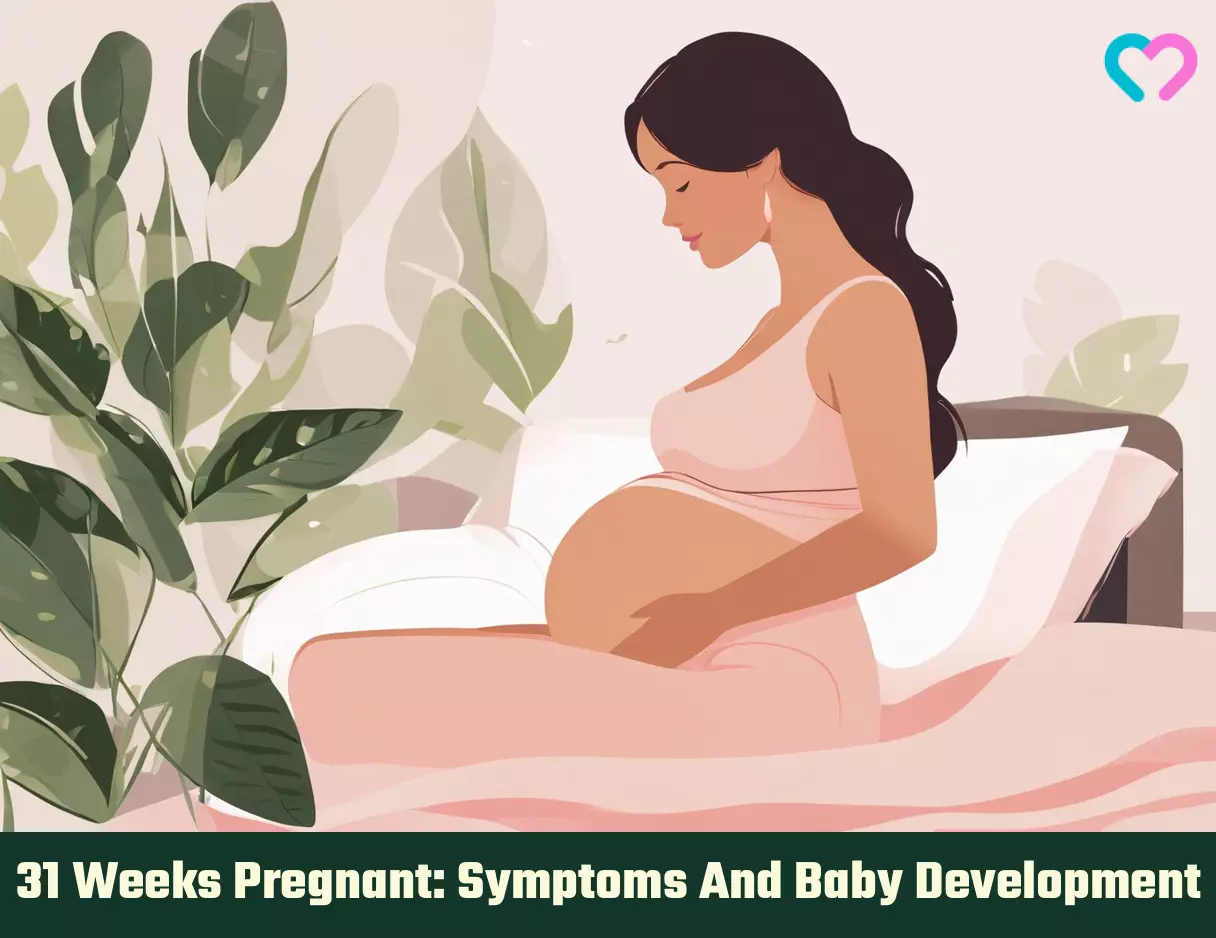
Image: Stable Diffusion/MomJunction Design Team
Get ready to learn about the changes your body is going through during the 31st week of your pregnancy and what to expect in the next weeks.
Personal Experience: Source
MomJunction articles include first-hand experiences to provide you with better insights through real-life narratives. Here are the sources of personal accounts referenced in this article.
i. Pregnancy update: 31 weeks and counting.https://kristinmoras.wordpress.com/2017/11/08/pregnancy-update-31-weeks-and-counting/
References
- Fetal development.
https://embryology.med.unsw.edu.au/embryology/index.php/Fetal_Development - Prenatal Summary.
https://www.ehd.org/prenatal-summary.php - Fetal development.
https://medlineplus.gov/ency/article/002398.htm - Your baby’s development.
https://kidshealth.org/en/parents/week31.html - While in womb babies begin learning language from their mothers.
https://www.washington.edu/news/2013/01/02/while-in-womb-babies-begin-learning-language-from-their-mothers/ - Pregnancy week-by-week.
https://www.nhs.uk/pregnancy/week-by-week/ - Prenatal Weight Gain Grid.
https://www.floridahealth.gov/programs-and-services/wic/health-providers/_documents/prenatal-weight-grid-multifetal.pdf - Pregnancy Test (hCG).
https://www.testing.com/tests/pregnancy-test-hcg/ - Pregnancy at 31.
https://www.pregnancybirthbaby.org.au/pregnancy-at-week-31 - Fatigue during pregnancy.
https://americanpregnancy.org/healthy-pregnancy/pregnancy-concerns/fatigue-during-pregnancy/
Community Experiences
Join the conversation and become a part of our nurturing community! Share your stories, experiences, and insights to connect with fellow parents.
Read full bio of Dr. Keeranmayee Mishra
Read full bio of shreeja pillai
Read full bio of Rebecca Malachi
Read full bio of Aneesha Amonz





